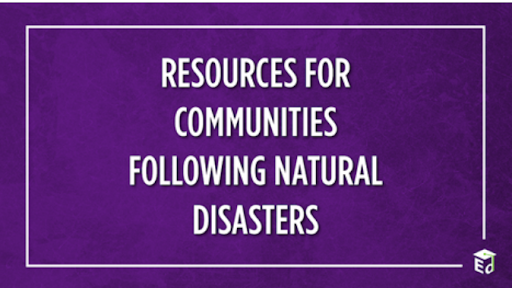Upcoming Events: April 17th Fight for Higher Education (Nationwide). Send tips to Glen McGhee at gmcghee@aya.yale.edu.
Search This Blog
Friday, November 1, 2024
Octavia Butler on Choosing a Leader (Democracy Now!)
Friday, October 11, 2024
Resources to Support Communities Impacted by Hurricanes Helene and Milton (US Department of Education)
Under President Biden’s and Vice President Harris’ direction, the Administration continues to mobilize a robust, intensive, and whole-of-government response to the impacts of Hurricane Helene. As life-saving response efforts continue in heavily impacted areas, the Administration is also working to ensure communities across the Southeast have prompt access to federal resources to purchase essential items and begin their road to recovery and rebuilding.
The Administration also pre-positioned additional personnel and resources to prepare for the impacts of Hurricane Milton (President’s remarks and White House fact sheets 1, 2, and 3).
The Department closely follows the impacts of natural disasters on students, educators, staff, families, and others. Schools are a critical aspect of whole community recovery and provide education, nutrition, physical fitness, mental health counseling, and other resources to students and their families during day-to-day operations. When schools close following a natural disaster, it is crucial that these resources remain available to the community and that schools are reopened and operating as soon as possible. In 2018, to better assist K-12 schools, the agency’s Office of Elementary and Secondary Education (OESE) formed a Disaster Recovery Unit (DRU). The agency’s Office of Postsecondary Education (OPE) and Federal Student Aid (FSA) office support postsecondary institutions.
In a press release and updated Homeroom blog, the Department curated resources, including several from other federal agencies and partner organizations, to restore the teaching and learning environment. Find more resources on the agency’s Natural Disaster Resources web page.
Wednesday, October 9, 2024
Shall we all pretend we didn't see it coming, again?: higher education, climate change, climate refugees, and climate denial by elites
Can US higher education do much to reduce climate change, either as a leader or as a teacher? The answer so far is no. That's not to say that there aren't universities (like Rutgers) doing outstanding climate change research or students concerned about the planet's future. There are. But that research and resistance is outweighed by those who control higher education, trustees and endowment managers, and their financial interests.
While devastating occurrences like Hurricane Helene (and possibly Hurricane Milton) serve as high-rated entertainment, news coverage also makes the stakes seemingly more visible to those who are not directly affected.
For many, hurricanes, wildfires, tornadoes, and heat waves are quickly forgotten or remembered merely as single acts of god or seasonal anomalies, not as ongoing acts of greedy rich men. And melting icebergs and disappearing islands are something most Americans don't see, at least firsthand. Generations of data and information are ignored by those who are poorly educated and those who claim to be educated, but uneducated morally.
Predictions of more global conflicts and an estimated 1.2 billion climate chaos refugees are barely mentioned in the news, but they are looming.
Related links:
Thinking about climate change and international study (Bryan Alexander)
